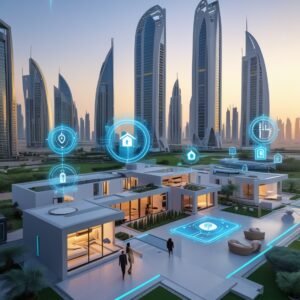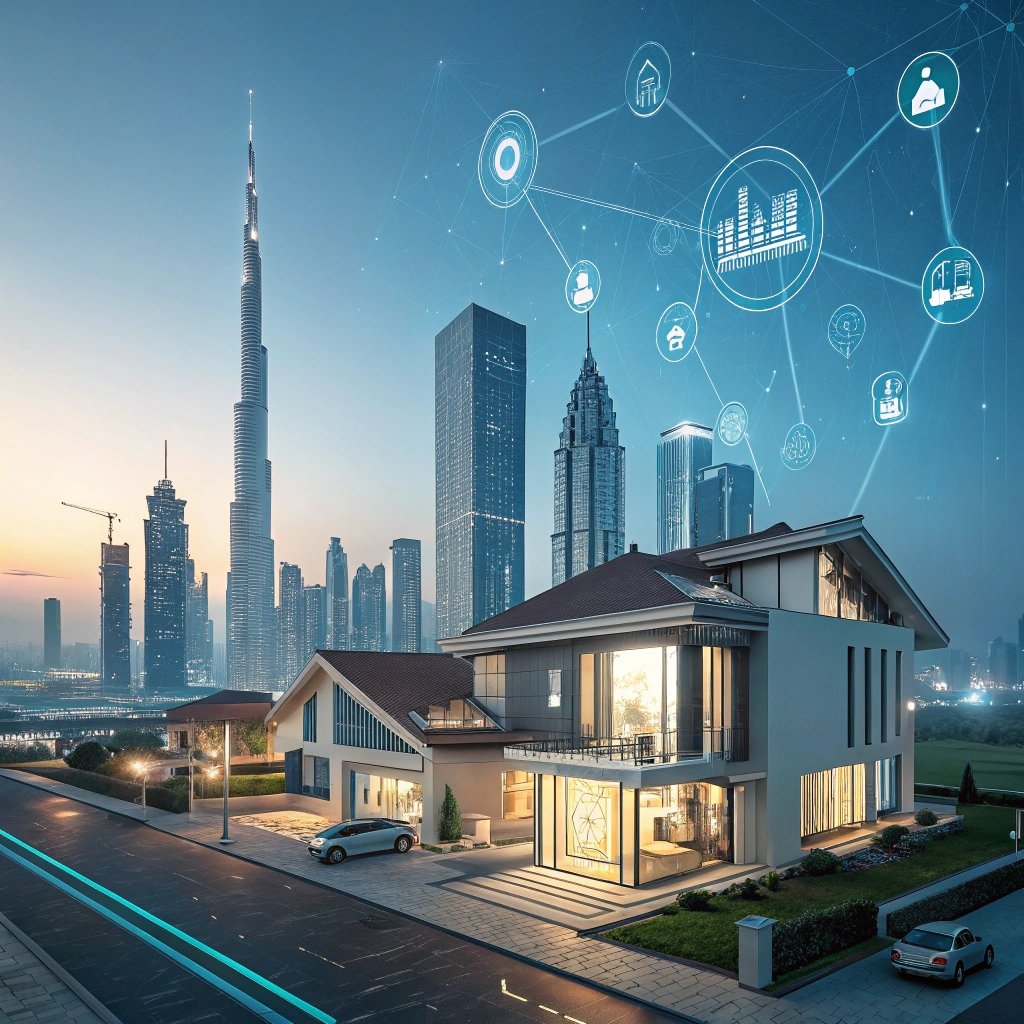It’s a world transforming at an incredible pace – and nowhere is that more evident than in how we buy, own, and invest in property.
For decades, real estate has been largely defined by traditional methods: agents, open houses, lengthy paperwork… it felt stuck in time. But now, something seismic is happening. Artificial intelligence and blockchain technology are poised to completely reshape the landscape of homeownership.
Imagine a future where buying property is seamless, transparent, and incredibly efficient – all while potentially unlocking significant returns on your investment.
Let’s dive into how these groundbreaking technologies are already impacting the UAE real estate market, and what it means for those looking to secure their financial future.
UAE Real Estate’s Digital Shift
Thinking about property ownership in the UAE feels… outdated, doesn’t it? Like a system built for a different era.
The idea of endless viewings, lengthy paperwork, and relying solely on agents might seem normal, but it’s increasingly inefficient and frankly, limiting.
Meanwhile, other nations are streamlining the process using cutting-edge technology – smart contracts, virtual tours, and sophisticated data analytics.
The shift isn’t just about convenience; it’s about unlocking a more transparent, secure, and potentially profitable way to invest in property.
Time spent Guiding traditional channels is time lost exploring these new possibilities – opportunities that could dramatically reshape how properties are bought, sold, and managed.
Here’s what isn’t widely discussed: the future of real estate isn’t about simply buying a building; it’s about owning a piece of a dynamic, digitally-driven ecosystem.
Let’s dive into exactly how Artificial Intelligence and Blockchain are transforming this landscape.
Blockchain’s Property Recording Revolution
Through blockchain’s property recording revolution, you’re seeing a fundamental shift in how ownership is tracked and verified. It’s moving beyond traditional paper-based systems to something far more secure and transparent.
Think about it – currently, property records are often stored across multiple government departments, each with its own system. This creates potential for errors, delays, and even fraud.
With blockchain, every transaction—from a sale to an easement—is recorded as a permanent, immutable block on the chain. You can see exactly who owns what, when it was transferred, and all related details.
This technology dramatically reduces the risk of disputes and fraud because everyone has access to the same verified information simultaneously. It’s like having a single, unchangeable record of ownership that is instantly accessible.
Essentially, blockchain creates an incredibly efficient and trustworthy system for property recording, offering significant benefits to buyers, sellers, and financial institutions alike.
AI-Powered Property Valuation Trends
Yes, AI-powered property valuation trends are changing how you understand your home’s worth. It’s a shift from traditional methods to something far more data-driven.
Algorithms now analyze massive amounts of information – things like recent sales prices in the area, property characteristics (size, location, age), and even economic indicators – to provide an estimate.
These algorithms can identify patterns that a human might miss, leading to more accurate valuations than relying solely on comparable sales. They also quickly adapt to changing market conditions.
You’ll see this reflected in the speed of assessments – they’re far quicker than a traditional appraisal. This is important when you are considering buying or selling property.
It’s about Managing technology for greater precision, and ultimately, giving you a clearer picture of your property’s true value.
Smart Contracts & Streamlined Transactions
Often, buying property feels like a complicated maze of paperwork, delays, and hidden fees. But imagine a system where transactions are faster, safer, and more transparent – that’s what smart contracts and blockchain technology are bringing to UAE real estate.
Smart contracts are essentially agreements written into code on a blockchain. Think of them as digital vending machines: once the conditions are met – like funds being transferred – the transaction automatically executes.
This means no more waiting for lawyers to manually verify documents or banks to process payments. Everything happens instantly and securely, eliminating potential delays and errors.
Blockchain technology creates a permanent, unchangeable record of every transaction. This builds trust between buyers, sellers, and developers by providing complete transparency.
You can see the entire history of an asset – ownership records, property details, and even mortgage agreements – all in one place. It’s like having a digital ledger that everyone agrees on.
This combination of smart contracts and blockchain is fundamentally changing how homes are bought and sold in the UAE. You can expect faster transactions, reduced costs, and increased security – making homeownership more accessible and efficient for everyone.
Predictive Analytics – Market Forecasting Shifts
Even predictive analytics – market forecasting shifts is a huge change in how real estate is approached. It’s moving beyond simply looking at historical sales data.
You’re now seeing algorithms analyzing everything from social media trends to local economic indicators and even satellite imagery. This helps predict demand for specific properties before they even hit the market.
For example, an AI might notice a surge in searches related to ‘family-friendly neighborhoods’ coupled with increased migration patterns – signaling potential high demand for homes in certain areas.

Blockchain technology is also playing a part by creating transparent and secure records of property transactions. This reduces fraud and increases trust between buyers and sellers, further streamlining the process.
Essentially, you’re moving from guesswork to data-driven decisions. The result? A more efficient and potentially profitable market for everyone involved – because the algorithms are constantly learning and adapting to changing conditions.
Virtual Reality Showcasing Property Investments
Virtual reality showcasing property investments is rapidly changing how people explore and purchase real estate in the UAE. You’re no longer limited by physical visits or brochures; instead, you can experience properties as if you were actually there.
This technology allows you to virtually walk through homes, apartments, and even entire communities – all from the comfort of your own device. It provides a much more immersive and detailed understanding of a property than traditional methods ever could.
Imagine exploring a luxury villa overlooking the Palm Jumeirah, or examining a modern apartment in Downtown Dubai—all without needing to travel. You can adjust lighting, view different floor plans, and even explore surrounding amenities, gaining a truly realistic sense of what it would be like to live there. This is transforming how buyers make decisions and significantly reducing the uncertainty associated with property investments.
The Rise of Digital Land Titles
If digital land titles are gaining traction in the UAE, it’s largely thanks to advancements in technology like blockchain and artificial intelligence. Traditionally, owning property involved a lengthy, paper-based process – lots of paperwork, physical signatures, and reliance on government registries. This system could be slow, prone to errors, and vulnerable to fraud.
Blockchain technology offers a secure and transparent way to record ownership information. Instead of relying on physical documents, your land title is represented as a digital token on the blockchain – essentially, it’s like having a super-secure, unchangeable record of who owns what.
Imagine you buy a property. With traditional methods, numerous parties need to be involved and consent given before the transfer of ownership can occur. Blockchain streamlines this process by creating an immutable ledger that everyone – the buyer, seller, bank, and government – can access securely. This dramatically reduces transaction times and minimizes potential disputes. AI is also playing a role in assessing property values and identifying risks associated with land titles, adding another layer of efficiency and accuracy to the process.
Cybersecurity Risks in Smart Property
You might be excited about smart homes and connected properties – it’s a fascinating shift!
However, this technological leap also introduces significant cybersecurity risks.
Smart property systems rely on intricate networks, making them vulnerable to hacking attempts. Imagine unauthorized access to your security cameras, thermostat controls, or even the locks on your doors – a serious breach of privacy and safety.
Protecting your smart home requires proactive measures focused on bolstering its defenses.
Start by using strong, unique passwords for every device connected to your network. Regularly update software to patch vulnerabilities. Enable two-factor authentication wherever possible – this adds an extra layer of security. Consider investing in a robust firewall and monitoring your network activity closely.
Staying informed about the latest cybersecurity threats and implementing these preventative measures will help you safeguard your smart property, ensuring peace of mind within your connected home.
Regulatory Frameworks – Adapting to Tech
Every regulatory framework is struggling to keep pace with the rapid advancements in UAE real estate’s tech revolution. The rise of AI and blockchain presents some unique challenges for governments and legal teams.
Currently, there isn’t a clear roadmap for how these technologies will be governed within property transactions. This creates uncertainty about ownership rights and smart contracts.
For example, verifying the authenticity of digital land titles using blockchain requires new legislation to ensure trust and prevent fraud. Similarly, AI-powered valuations need standardized guidelines to avoid bias or inaccuracies.
You’ll notice that adapting these frameworks is proving complex because traditional regulations often focus on physical assets and manual processes. These aren’t easily translated into the digital world.
The legal definition of ‘property’ itself needs to evolve – does it still solely refer to a physical building, or can it encompass digital ownership rights within a metaverse property? It’s a question regulators are grappling with.
Ultimately, the process involves establishing clear rules around data privacy, smart contract enforcement, and ensuring transparency in AI-driven valuations – all while maintaining consumer protection.
Investor Engagement & Metaverse Real Estate
When investor engagement is considered within the UAE’s real estate market, it’s becoming increasingly sophisticated thanks to technologies like artificial intelligence (AI). AI-powered platforms are now helping potential buyers analyze vast amounts of data – property values, location trends, and even neighborhood demographics – far more efficiently than traditional methods. This allows you to make informed decisions based on solid insights rather than just gut feelings.
Furthermore, the rise of metaverse real estate is creating exciting new avenues for investment. You can now purchase virtual land plots within digital worlds, which are often linked to actual physical properties in the UAE and used for everything from luxury retail experiences to community building.
Imagine owning a plot of land in a simulated Dubai beachfront – you could develop it, rent it out, or even sell it as the metaverse evolves. These digital assets offer unique investment opportunities, although they come with their own set of risks and considerations that you should carefully research before investing.
The Future of PropTech in Dubai
The future of proptech in Dubai is being dramatically reshaped by technologies like artificial intelligence (AI) and blockchain. You’ll see these innovations impacting nearly every aspect of homeownership – from initial searches to ongoing property management.
Specifically, AI is assisting with property valuations, predicting market trends, and even personalizing recommendations for potential buyers based on their preferences and financial situations. This allows you to make more informed decisions about where you’re looking to invest.
Imagine an app that analyzes thousands of properties in Dubai, considering factors like location, amenities, and historical sales data – all powered by AI – to suggest the best options for your needs. Blockchain is also playing a key role by streamlining transactions, increasing transparency, and reducing fraud within the real estate sector.
A Future Built on Innovation
The traditional notion of property transactions is rapidly evolving, and it’s genuinely exciting to witness. Developments powered by artificial intelligence and blockchain technology aren’t just buzzwords; they represent a fundamental shift in how people own, invest in, and manage real estate within the UAE. Smart contracts are streamlining processes, reducing friction, and increasing transparency – things that were previously bottlenecks are now becoming incredibly efficient.
This technological integration is attracting serious investors who recognize the potential for increased security, reduced costs, and faster transactions. The ability to verify property titles instantly and securely through blockchain creates a level of trust that’s simply unmatched by legacy systems. Furthermore, AI-driven analytics provide valuable insights into market trends and investment opportunities, empowering stakeholders with data-backed decisions.
Embracing these innovations isn’t just about keeping pace; it’s about seizing a significant advantage. By Managing the power of digital technologies, the UAE is establishing itself as a global leader in smart property solutions. Don’t get left behind – explore these advancements and unlock the boundless possibilities that await within the future of real estate. Invest wisely, innovate boldly, and shape the next generation of homeownership.





Leave a comment